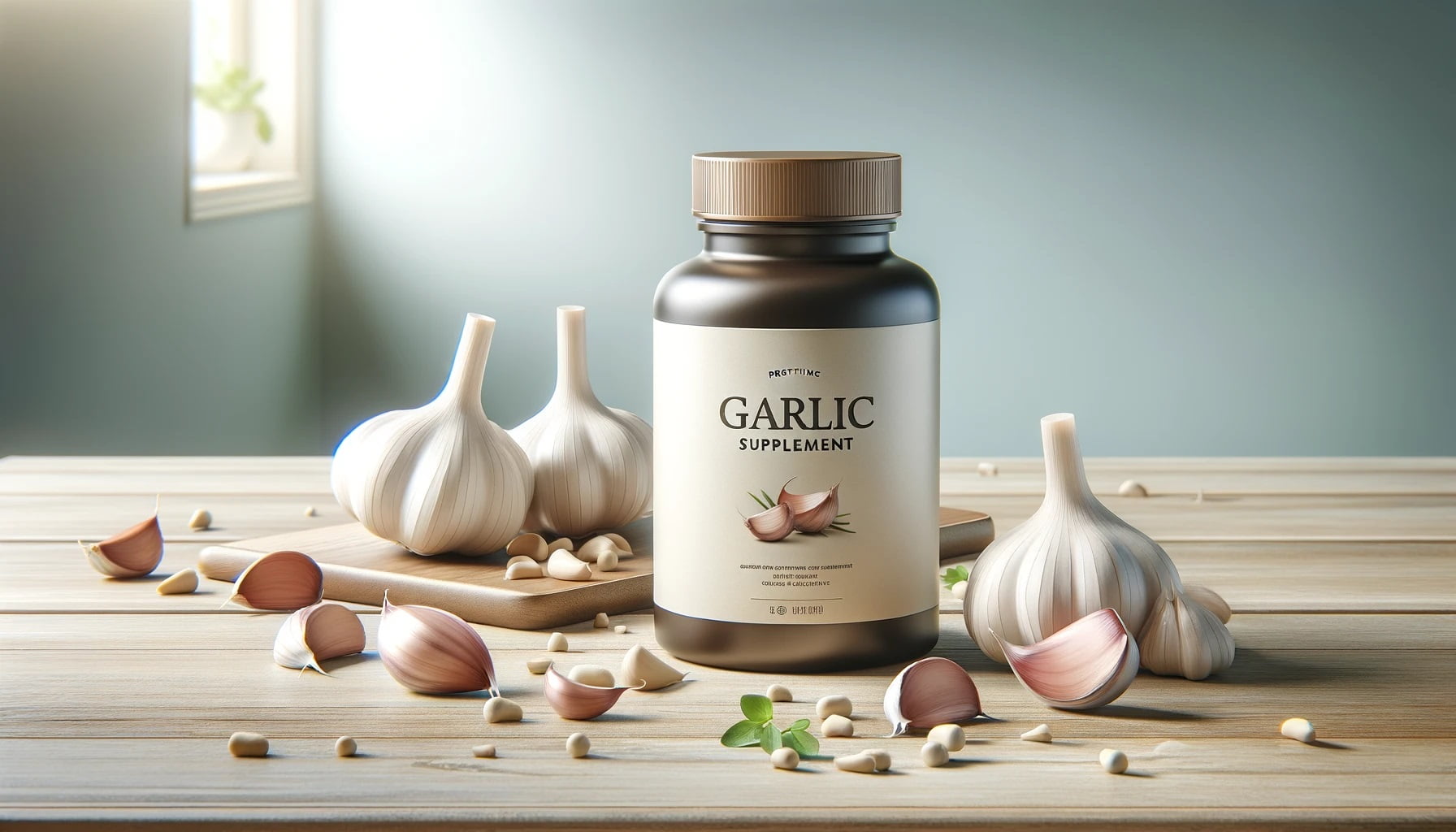
Garlic isn’t just a simple kitchen ingredient that adds flavor to your meals; it also boosts your brainpower.
Rich in sulfur compounds, garlic boosts immune function, lowers blood pressure, reduces inflammation, and improves cognitive health. It also has neuroprotective, antioxidant, and potential anticancer properties.
While generally safe, garlic can interact with certain medications and may cause side effects in some individuals.
Table of Contents
What is Garlic?
Garlic, scientifically known as Allium sativum, is a pungent bulbous plant closely related to onions, leeks, and chives. It’s been used for thousands of years as both a culinary ingredient and medicinal herb.

The health benefits of garlic are attributed to its rich content of sulfur compounds like allicin, which is formed when garlic cloves are crushed or chopped.
How has Garlic Been Used Traditionally?
Garlic has a long history of use in traditional medicine systems worldwide, including Ayurveda, traditional Chinese medicine, and ancient Egyptian medicine.
It was used to treat a wide range of ailments, from digestive issues and respiratory infections to skin diseases and parasites. In many cultures, garlic was also believed to have protective or aphrodisiac properties.
What are the Health Benefits of Garlic?
Numerous studies have confirmed garlic’s potent medicinal properties. It has been shown to:
- Boost immune function
- Lower blood pressure and cholesterol
- Reduce inflammation
- Improve circulation
- Have anti-cancer effects
- Exhibit antimicrobial activity against bacteria, viruses, and fungi
What are the Nutritional Components of Garlic?
Garlic is an excellent source of several essential vitamins and minerals. A 100g serving of raw garlic provides:
| Nutrient | % of Daily Value (DV) |
|---|---|
| Manganese | 84% |
| Vitamin B6 | 62% |
| Vitamin C | 52% |
| Selenium | 20% |
| Fiber | 9% |
These nutrients support various physiological functions, from energy production and nerve signaling to antioxidant protection and bone health.
What Are the Key Active Compounds in Garlic?
The main biologically active compounds in garlic are organosulfur compounds derived from allicin.
When raw garlic is chopped or crushed, the enzyme alliinase converts alliin into allicin. Allicin then rapidly degrades into various sulfides, including:
| Compound | Benefits |
|---|---|
| Diallyl disulfide (DADS) | Anti-inflammatory, antioxidant, and potential anticancer properties |
| Diallyl trisulfide (DATS) | Cardioprotective effects, reduces blood pressure, and supports immune function |
| S-Allyl cysteine (SAC) | Neuroprotective effects, improves cognitive function, and supports liver health |
| Ajoene | Antimicrobial, antifungal, and potential anticancer properties |
| Allyl mercaptan | Antioxidant properties, supports cardiovascular health, and detoxification benefits |
These sulfur compounds are largely responsible for garlic’s pungent aroma and many of its health benefits.
What are the Cognitive Benefits of Garlic?
Garlic has significant cognitive-enhancing effects. Its neuroprotective, anti-inflammatory, and antioxidant properties make it a promising natural nootropic for boosting brain health and function.

Does Garlic Improve Memory and Learning?
Garlic has been shown to improve memory and learning abilities in several studies. For example, aged garlic extract improved short-term memory and prevented learning deficits in subjects with neurodegenerative disorders.(1)
These effects are attributed to garlic’s ability to:
- Increase brain serotonin levels
- Reduce oxidative stress in the hippocampus
- Prevent beta-amyloid plaque formation
- Enhance neurogenesis (growth of new brain cells)
Does Garlic Improve Focus and Attention?
Garlic helps improve focus and attention by optimizing neurotransmitter function. In a study on healthy volunteers, garlic powder improved task performance on a cognitive demand battery and reduced subjective fatigue.(2)
Garlic’s positive effects on attention are due to:
- Increasing noradrenaline and serotonin levels
- Modulating GABA signaling
- Improving cerebral blood flow
- Reducing neuroinflammation
Does Garlic Slow Cognitive Decline?
Several lines of evidence suggest garlic may slow age-related cognitive decline and protect against neurodegenerative diseases.
In a clinical trial, daily high-dose aged garlic extract supplementation for 12 weeks improved cognitive function in patients with Alzheimer’s disease (AD).(3)
AD is characterized by the accumulation of beta-amyloid plaques and tau protein tangles in the brain, leading to progressive neuronal death and dementia.
Garlic helps prevent or slow this process by:
- Protecting neurons from beta-amyloid induced toxicity
- Enhancing the brain’s antioxidant defenses
- Stimulating the release of neurotrophic factors such as NGF and BDNF
Does Garlic Promote Neuroprotection?
Garlic’s neuroprotective properties have been demonstrated in various experiments of brain injury and neurotoxicity.
For instance, aged garlic extract protected against damage induced by cerebral ischemia (reduced blood flow), improving neurological deficits and preventing neuronal loss.(4)
Another study showed that allicin form garlic reduced brain edema, blood-brain barrier disruption, and neuronal apoptosis following traumatic brain injury.(5)
These neuroprotective effects are attributed to garlic’s:
- Anti-inflammatory effects
- Antioxidant properties
- Ability to modulate cell signaling pathways involved in neuronal survival and death
How to Consume Garlic for Health Benefits?
For maximum health benefits, garlic should be consumed raw or in the form of aged garlic extract.

Raw garlic must be crushed, chopped, or chewed to activate the alliinase enzyme and release allicin. Cooking garlic may reduce its allicin content.
Aged garlic extract (AGE) is a popular supplement form that provides a standardized dose of active compounds. AGE is produced by aging garlic in ethanol for up to 20 months, resulting in an odorless product rich in stable sulfur compounds like S-allyl cysteine.
What is the Recommended Dosage of Garlic Supplements?
The optimal dosage of garlic depends on the specific preparation and intended use. Generally, a daily dose of 600-1200 mg of a standardized garlic extract is considered effective for most people.
The effective dosages for various health benefits are:
| Health Benefit | Daily Dosage |
|---|---|
| General health maintenance | 600-900 mg |
| Cardiovascular health | 600-1200 mg |
| Immune support | 600-1200 mg |
| Cognitive function | 1000-2000 mg |
How Quickly Can One Expect Results from Garlic?
The time frame for noticing results from garlic supplementation varies depending on the specific health parameter and individual response.
Some effects, such as improved digestion and circulation, may be apparent within a few days or weeks.
Other benefits, like cognitive enhancement, may take several weeks to months of consistent use to manifest.
How Long Does Garlic Stay Effective in the System?
Allicin, the main active ingredient in raw garlic, is rapidly metabolized and excreted, with an estimated half-life of 2.5 hours. However, S-allyl cysteine (SAC), the key active compound in aged garlic extract, has a much longer half-life of about 10 hours.
This means the effects of aged garlic extract may last longer than those of raw garlic, especially with repeated daily dosing.
What are the Potential Side Effects of Garlic?
While garlic is generally safe and well-tolerated, some people may experience side effects, especially when consuming large amounts.
The most common side effects of garlic supplements include:
- Bad breath
- Gastrointestinal discomfort (bloating, gas, nausea, diarrhea)
- Headache
- Dizziness
- Allergic reactions (rare)
Aged garlic extract causes fewer side effects than raw garlic, as the aging process removes the odorous sulfur compounds.
Gastrointestinal side effects can be minimized by taking garlic with food.
Can Garlic Interact with Medications?
Yes, garlic can interact with certain medications due to its blood-thinning, blood sugar-lowering, and cytochrome P450 enzyme-inducing effects. Notable interactions include:
- Anticoagulants (warfarin): Garlic may increase bleeding risk
- Antiplatelet drugs (clopidogrel): Garlic may enhance their effects
- Antidiabetic medications: Garlic may cause additive blood sugar reduction
- HIV protease inhibitors: Garlic may reduce their effectiveness
- Contraceptive drugs: Garlic may decrease their efficacy
Always inform your healthcare provider about any garlic supplements you are taking, especially if you are on medication or have a bleeding disorder.
Are There Any Contraindications or Precautions for Using Garlic?
Garlic is contraindicated in people with known allergies to garlic or other Allium species (onions, leeks, chives). Precautions should be taken in certain situations:
- Surgery: Discontinue high-dose garlic at least 7-10 days before elective surgery to prevent bleeding.
- Pregnancy and lactation: Avoid medicinal doses of garlic unless prescribed by a qualified healthcare practitioner.
- Thyroid disorders: Monitor thyroid function, as garlic may interfere with iodine uptake.
- Gastrointestinal conditions: High doses may aggravate heartburn, ulcers, or GERD.
- Ray, B., N. B Chauhan, and D. K Lahiri. “The “Aged Garlic Extract”(AGE) and One of its Active Ingredients S-Allyl-LCysteine (SAC) as Potential Preventive and Therapeutic Agents for Alzheimer’s Disease (AD).” Current medicinal chemistry 18.22 (2011): 3306-3313.↩
- Pittler, Max H., and Edzard Ernst. “Clinical effectiveness of garlic (Allium sativum).” Molecular nutrition & food research 51.11 (2007): 1382-1385.↩
- Farooqui, Akhlaq A., and Tahira Farooqui. “Garlic and its effects in neurological disorders.” Neuroprotective effects of phytochemicals in neurological disorders (2017): 113-131.↩
- Mathew, B. C., and R. S. Biju. “Neuroprotective effects of garlic a review.” Libyan Journal of Medicine 3.1 (2008): 23-33.↩
- Nillert, Nutchareeporn, et al. “Neuroprotective effects of aged garlic extract on cognitive dysfunction and neuroinflammation induced by β-amyloid in rats.” Nutrients 9.1 (2017): 24.↩
